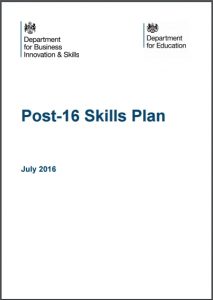The Houses of Parliament in London are falling down and in need of what will be a multi-billion restoration project. As a result, Members of Parliament, peers and civil servants are facing a skills gap literally on their crumbling doorstep.
Construction News reported last week (Specialist skills shortage poses ‘risk’ to £4bn Parliament restoration [£]) that Parliament’s Joint Committee on the Palace of Westminster had warned that a lack of specialist skills across the sector could hamper the parliamentary restoration programme. In a report (Restoration and Renewal of the Palace of Westminster – available here), the committee devoted a section (“Managing the supply chain“) of Chapter 6 to detailed discussion of the need for specialist construction skills.
The committee received evidence from construction industry organisations including the RIBA, RICS and CIBSE, all of whom pointed out the need to start investing at the earliest possible opportunity in the skills that will be needed to deliver the Westminster restoration and renewal (R&R) programme. It also highlighted that most of these skills tend to be found the heritage and conservation sectors, where the vast majority of firms are small and medium-sized enterprises (SMEs).
- The RIBA told the committee a “great skills shortage issue resulting from declining investment into the conservation sector and a large pipeline of works in the UK that would divert resources from the R&R Programme.” But even without this pipeline of expected works, there might still be insufficient skills available in the market to tackle the scale of the challenge entailed in the R&R Programme – even though it’s expected to start no sooner than 2023.
- RICS suggested the R&R programme might become an “exemplar project” demonstrating how training and the sustainability of skills could be built into large programmes.
- CIBSE also suggested that, rather than viewing the supply and capacity as a challenge, the R&R programme provided a unique opportunity to develop a new generation of skilled heritage workers, through apprenticeships and other career development activity, and also to bring a significant number of young women into the sector (diversity being an ongoing issue – post).
The committee was clearly under no illusion of the need to start engaging with supply chains, and also recognised that the project provided opportunities not only to engage with SMEs, but to spread the work well beyond London and the south-east of England (in much the same way that Crossrail has involved companies the length and breadth of the UK), and to develop a strategy for training and creating apprenticeships that would leave a legacy of skills and experience.
In short, the Westminster project, is, to use the RIBA’s words, “an ideal opportunity for educating and training the next generation in the skills needed to maintain, repair and enhance the historic buildings and to be an ongoing exemplar project for those skills and craftsmanship.” With SkillsPlanner’s focus on skills in London and the southeast, we will be watching for any mobilisation with respect to this project with interest.



 Each work-stream is being led by a relevant organisation that will submit recommendations to the Taskforce by the end of the year, and the Chartered Institute of Building (CIOB, author of a 2015 report on the
Each work-stream is being led by a relevant organisation that will submit recommendations to the Taskforce by the end of the year, and the Chartered Institute of Building (CIOB, author of a 2015 report on the  Mr Hawkes said that the CIOB will analyse the responses it receives and then host ‘inquiry-style discussions’ before submitting its recommendations to the National Housing Taskforce by the end of the year. The final National Housing Taskforce report, incorporating recommendations from all 12 workstreams, is expected to be released by spring 2017.
Mr Hawkes said that the CIOB will analyse the responses it receives and then host ‘inquiry-style discussions’ before submitting its recommendations to the National Housing Taskforce by the end of the year. The final National Housing Taskforce report, incorporating recommendations from all 12 workstreams, is expected to be released by spring 2017.

